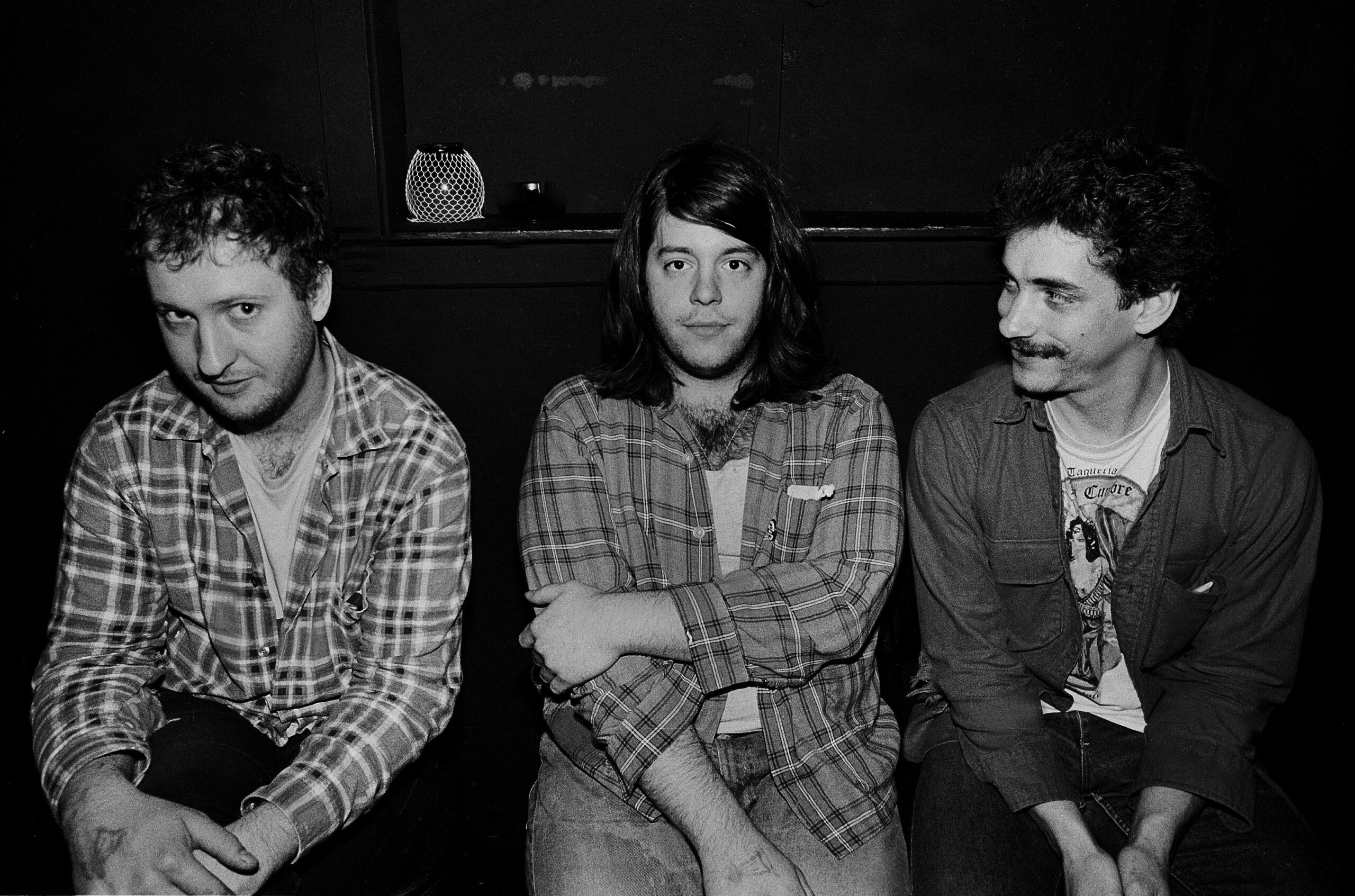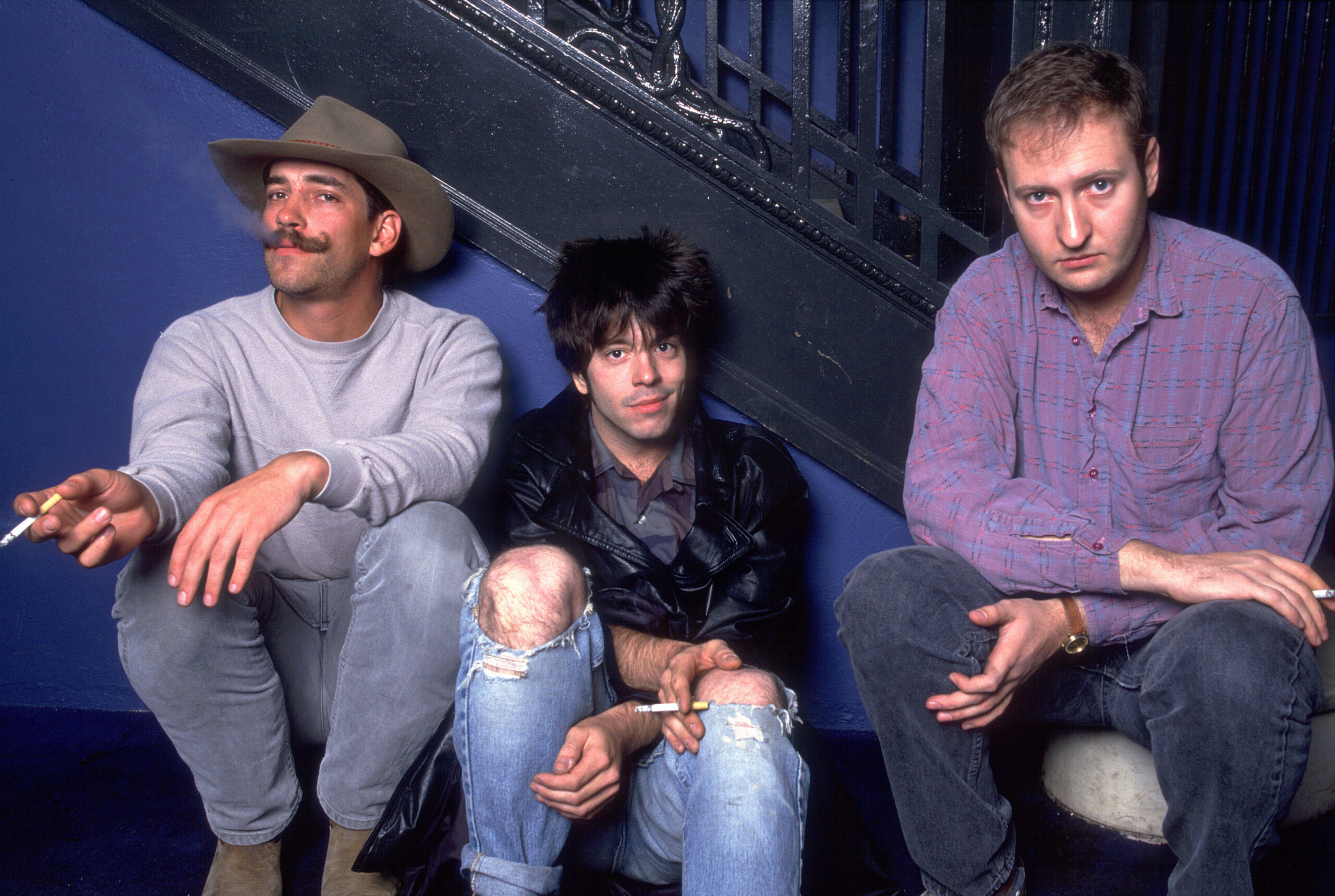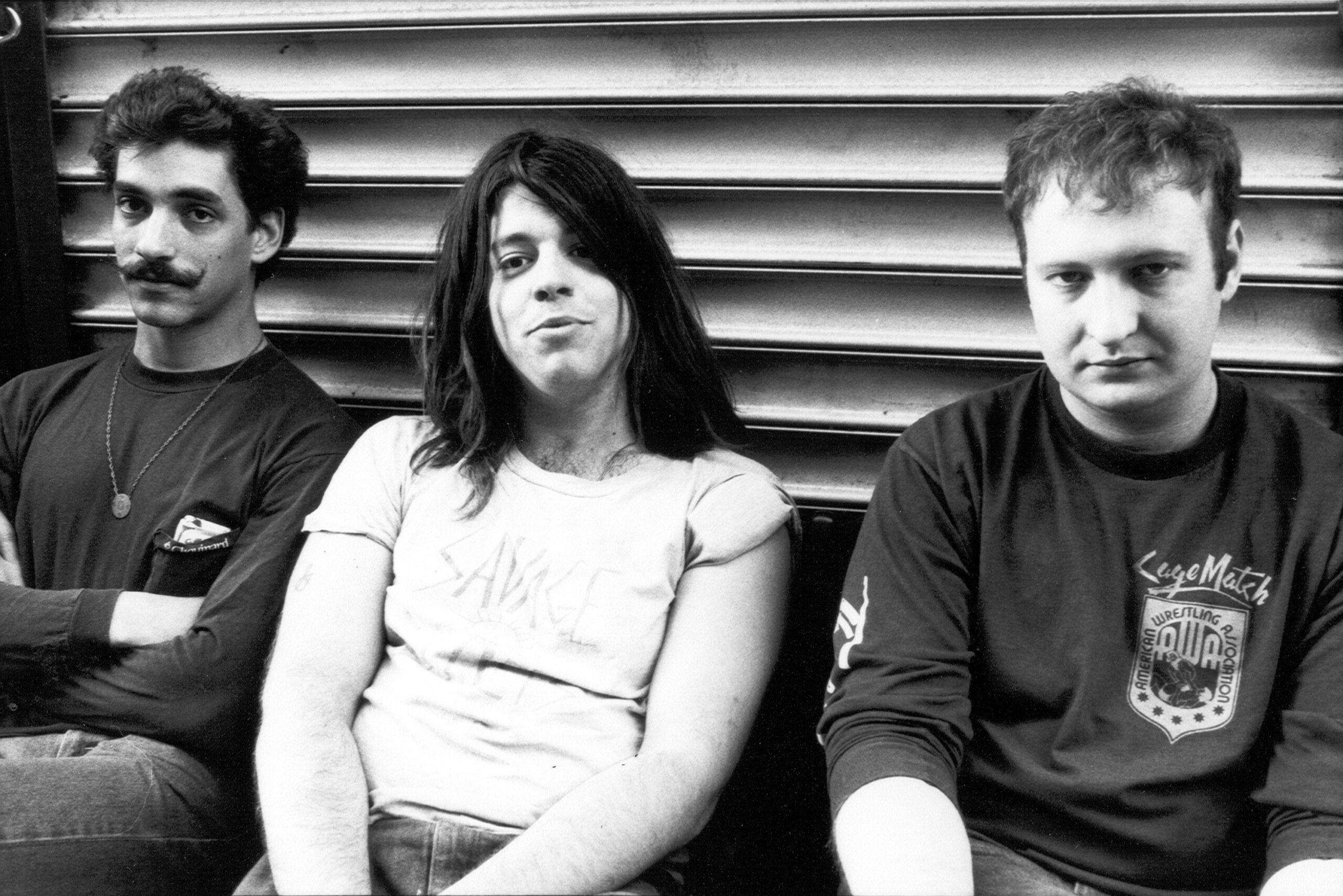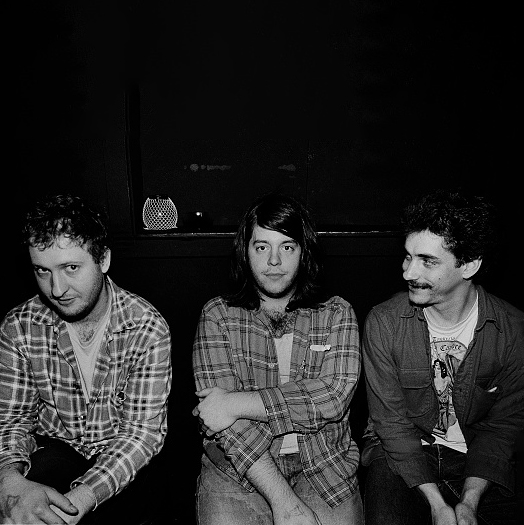Mojo
FEATURE
Perfect Example
The key band in hardcore punk’s mutation into alternative rock, Hüsker Dü lit a fire in all-comers before drugs, jealousy and major labels joined to topple them. It’s a final, unbearable irony that a revelatory release of their exciting early music in 2017 should’ve coincided with the untimely death of their drummer, co-singer and romantic core: Grant Hart.
Words by Keith Cameron

Everything Falls Apart: (l-r) Bob Mould, Grant Hart and Greg Norton of Hüsker Dü, Chicago, 1985.
Early in the evening of March 14, 1986, Grant Hart walked up to the older woman on reception at Edinburgh University’s Potterrow Student Union and smiled his sweetest smile. “Excuse me ma’am,” he said, “but could you tell me where the rest-room is?”
Unfamiliar with American vernacular for the loo, the woman was puzzled. “Well,” she eventually offered, “there is a room upstairs that has a couch in it. You could probably go up there if you need to take a rest.”
Hüsker Dü didn’t really ‘do’ rest. In 1985, Grant Hart and his bandmates Bob Mould and Greg Norton played a hundred gigs. The year before that, a mere 90. In the four years beginning January 1982, the trio from Minnesota made six albums, one of them a double: Zen Arcade, the record which exploded the artistic para-meters for hardcore punk in particular and underground music in general, pointing a way beyond noise and negation, ultimately creating a new hyper-form of pop. Their labelmates on legendary California independent SST included Black Flag, Minutemen and Sonic Youth – iconoclasts all, but Hüsker Dü were reconfiguring rock’s emotional DNA, throwing covers of The Beatles (Ticket To Ride), Byrds (Eight Miles High) and Donovan (Sunshine Superman) into their psychedelic melody furnace.
March 1986 saw the release of Candy Apple Grey, the band’s debut for Warner Bros. For the first time, a band from hardcore’s philosophical nexus had signed with a major label – a tricky move, but momentum seemed to be with them. Hüsker Dü were a revolution in the heart, one that would eventually lead to Nirvana.
So much for the future. Pinned to the rear wall of the Potterrow’s upstairs room that night in Edinburgh, however, the main concern was how to restore a blown mind. Hüsker Dü began at volcanic force and then got fiercer. No gaps between songs, no respite from the energy triangulating between the three members: out front, Mould the guitarist, barking out sing-along alienation parables like Makes No Sense At All, a tensed-up man on the brink; bassist Norton his grinning accomplice, daring the crowd to jump higher, go faster; Hart, meanwhile, played drums like he was conducting the wind and sang like an angel with a weekend pass to the mortal world, telling us about The Girl Who Lives On Heaven Hill, or Books About UFOs, which he furnished with a whistling solo. Amid angst and rage, Hüsker Dü also dealt in levity – and their smile reflex was curated by Grant Hart.
Afterwards, I saw him sat on a stone bench under the student union’s domed roof, chatting away like just another excited kid in the crowd. Noticing for the first time that he had been playing drums barefoot, I burst out laughing. Grant looked at me and laughed back.
In January 1988, after one final album, Warehouse: Songs And Stories – another double – Hüsker Dü broke up. The fallout was bitter, between Hart and Mould especially. Rumours swirled about Hart’s heroin problem, about Mould’s control-freakery. A dire portent had been the suicide in February 1987 of manager David Savoy shortly before a 50-date US tour in support of Warehouse. But the internal bonds had been fraying for some time. Hüsker Dü had their limits. Everything falls apart.
“That UK tour in March 1986 – that was still fun,” says Greg Norton. “We were still at a relatively small level, even though we’d signed for Warner Brothers. It was the summer of ’87, when we’ve got the big tour coach, that felt like everybody was in their own separate world. But really, Zen Arcade, New Day Rising and Flip Your Wig, that two-and-a-half-year period, those three records – such great music. It was a lot of fun. It may not necessarily have felt revolutionary at the time, but we were just making music that we felt was true to us. We weren’t trying to be anything in particular, besides us. And that made it OK for everybody to be that.”

Don’t Want To Know If You Are Lonely: Hüsker Dü in 1987 in Chicago
A few hours after the news of Grant Hart’s death from cancer emerged on the morning of September 14, I called Greg Norton. We had a pre-arranged interview, to discuss Savage Young Dü, the Numero Group box set of Hüsker Dü’s early years. Until that day, I was awaiting confirmation of similar appointments with Grant and Bob: the first official Hüsker Dü promo in almost 30 years.
“We all knew Grant was ill,” said Greg. “He had been telling people he had maybe a year or less. I think we all hoped that meant a year or more. So the suddenness of this has taken the wind right out of me.”
We agreed to postpone until the following week. In the meantime, Bob Mould posted a heartfelt tribute on Facebook, recalling the day in November 1978 when he and Grant met outside Cheapo, the record shop Hart worked in near Macalester College in Saint Paul, Minnesota. “The next nine years of my life was spent side-by-side with Grant,” Bob wrote. “We made amazing music together. We (almost) always agreed how to present our collective work to the world. When we fought about the details, it was because we both cared. The band was our life. It was an amazing decade.”
Mould went on to acknowledge the “sometimes difficult” nature of their relationship following their band’s split, expressed his appreciation for Hart’s gifts as a visual artist, story teller and “a frighteningly talented musician” and offered condolences to family and friends. Two photographs accompanied the testimonial: one from early Hüsker Dü days, the other a recent shot, confirming reports that the pair had met shortly before Hart’s passing. “Godspeed Grant,” Mould concluded. “I miss you. Be with the angels.”
Grant and Greg also met in a record shop. In March ’78, Norton was taking a break from his shift at Melody Lane, whose owner also ran Cheapo, when he was assailed by a just-turned-17 Hart, who accused him of stealing his job.
“I’m like, Who are you, what are you talking about?!” Norton laughs. “He said, ‘I’ve been hanging out at Melody Lane and the manager said as soon as I turned 16 she’d give me a job but they hired you.’” Norton sweet-talked his boss and Hart got in too. Soon the pair were taking trips across the Mississippi into neighbouring Minneapolis to see bands at Jay’s Longhorn Bar, the epicentre of the Twin Cities’ underground scene.
“We had a voracious appetite for punk rock,” says Norton. “He brought his drumkit and his Farfisa organ over and set them up in the basement of my mom’s house. I had my bass down there and we would just make noise. Grant even [called] us the Electro-Cutes – he made up a little business card. We never played any gigs and quite honestly I don’t think we wrote any songs, but that’s probably where the name Hüsker Dü ends up coming from: Grant and I sitting around one night, he’s making up parody lyrics to Psycho Killer and when it gets to the chorus, I’d shouted out, ‘Hüsker Dü!’ instead of ‘Qu’est-ce que c’est!’ We thought it was funny.”
“It was all blazing fast for a while. We had to work through that for the melody to work its way back in.”
Greg Norton
It’s possible that one of Hart and Norton’s trips to the Longhorn would have coincided with a similar pilgrimage by 17-year-old Macalester freshman Bob Mould to see local punk stars the Suicide Commandos. But the members of Hüsker Dü wouldn’t actually meet until November 18, when the newly acquainted Hart and Mould accompanied Norton to see the Ramones open for Foreigner at Saint Paul Arena. Two months later, the trio assembled in Mrs Norton’s basement, after Hart’s boss at Cheapo, Charlie Pine, tasked him with putting together a band to play a local bar. Mould had an Ibanez Flying V – in homage to the New York Dolls’ Syl Sylvain – and although Pine’s brokerage of the gig earned him membership rights, playing Hart’s Farfisa, the others decided he didn’t fit their punk ethos. Nor were they thrilled with his choice of band name, Buddy & The Returnables – with Pine as ‘Buddy’, it meant the others were ‘returnable’. Norton suggested they call themselves ‘Hüsker Dü’ instead.
“It means ‘do you remember?’, as in, ‘Do you remember when rock’n’roll was good?’ We liked it because it was a foreign phrase, you couldn’t pigeonhole the band based on the name. For our very first gig, Grant actually made a flyer that said: ‘First time in the US! Hüsker Dü!’”
Charlie Pine lasted just three gigs of punk covers before the true Hüsker Dü line-up debuted at the Longhorn Bar on May 13, 1979. Already things were moving fast: in just a few weeks they had built a set of originals.
“A lot of the early days of Hüsker Dü was experimentation through emulation,” Mould recalled in 2016. “Those things ranged from powerpop to straight-up copies of Joy Division, The Cure, stuff like that. Three people trying to find a common identity.”
Their quest was driven by a zealous work ethic. Building a practice space in the basement of Norton’s latest record shop, Northern Lights, the band rehearsed for up to four hours every night. “We all quickly became friends,” says Norton. “That’s the thing about that early era of Hüsker Dü – the three of us hanging out and writing music like crazy. The songs were just pouring out of Bob. And Grant as well. One of the very first songs is called Sex Dolls. Because it sounded like a cross between the Sex Pistols and the New York Dolls. We were definitely also influenced by the Ramones and the Buzzcocks, and bands like The Jam and Joy Division as well.”
Had Ian Curtis not committed suicide on the eve of a US tour in 1980, Hüsker Dü would have been the support act for Joy Division’s Minneapolis show on May 29. That year they became de facto resident band at the downtown Minneapolis 7th Street Entry club, opening for the Ramones and Mission Of Burma, honing their set, ruthlessly discarding older material as a harder, faster template emerged, dictated by the need to make an impression in limited time. Through early studio sessions and live recordings, Savage Young Dü documents the journey to hardcore’s outer extremities, which ultimately coalesced during the summer of 1981’s so-called Children’s Crusade, a demented eight-week haul through Canada, down the West Coast from Seattle to San Francisco, where they lived with Dead Kennedys’ Jello Biafra for a month, then back to the Midwest for an August 15 homecoming at the 7th Street Entry. That night’s first, super-fast set was taped and became Land Speed Record, the debut Hüsker Dü album, released on Minutemen bassist Mike Watt’s New Alliance label in January 1982.
“I’ve always liked Bob’s explanation of Land Speed Record,” says Norton. “‘We covered a lot of land, we took a lot of speed and then we cut a record.’ It was all blazing fast for a while. It’s like we had to work through that in order for the melody and the harmony to work their way back in.”
Besides playing the music, each member fulfilled distinct auxiliary roles: Hart created artwork for record sleeves and posters; Mould booked tours and ran the office; Norton did most of the driving. Philosophically, they began to question hardcore’s political rulebook. “One of the things Hüsker Dü always kept in mind was the personal landscape,” Mould told MOJO in 2015. “As opposed to edicts like the anarchist bands of the late ’70s. We weren’t really into that, especially by 1983/84 when we started thinking about Zen Arcade and New Day Rising and Flip Your Wig.”

It was in the area of songwriting that Hüsker Dü sealed their immortality but also their fate. Earlier records had been collaborative, with Norton co-writing and occasionally singing, yet by 1983’s SST debut Metal Circus there was a clear demarcation between Grant Hart and Bob Mould compositions. Initially, at least, the process was mutually beneficial.
“Everything was going our way,” said Mould. “We had a real moment there with those three records. Incredible creativity. The one that has the best memories for me is Flip Your Wig, because the three of us, and most importantly me and Grant, were working side by side for the exact same cause. That was the band at full throttle and in full control. The thing nobody saw coming was getting in with Warners. Everything started getting a little shaky. One of the biggest factors was all the acclaim we were getting from the press. It’s like, ‘Here’s your crown…’ On Candy Apple Grey, Grant had his own song, I had my own song. It put little cracks in things.”
Long since excluded from the songwriting process, Norton watched as his friends’ competitive rivalry became toxic. By taking on the mundane administrative duties the band had previously performed for themselves – as Norton puts it, “the things that really helped make us Hüsker Dü” – Warner Bros inadvertently hastened their new investment’s demise. Hüsker Dü wouldn’t be the last great American rock band to become alienated from each other and their art on a major label, but they were the first.
“You see three people moving away from the only thing they really have in common,” said Mould. “I quit drinking and started withdrawing. Greg got married and moved out to the country. And Grant found a new set of friends.”
Hart’s heroin use reached crisis point on a Midwest tour in December 1987, and became widely blamed for the band’s split. Norton, however, takes a broader view.
“Grant was having a lot of distractions,” he says. “But that could have been dealt with. Really, it’s the clash of personalities between the songwriters. I think heroin is an excuse. Grant, of course, claims that he quit. Technically, Bob was the one who removed himself from the contract. In reality, I was the only one that had any interest in trying to keep the band together.
Towards the end, my role was to stay out of it, to not pick a side. I didn’t want to pick a side. Grant always considered me on his side because, ‘Well obviously you’re against Bob, because he’s Bob…’ And I don’t think Bob gave a shit one way or another. It was a difficult situation to be in.”
Almost two years after Hüsker Dü split up, I met Grant Hart at the bar of the Columbia Hotel in central London, on the eve of his debut solo album Intolerance. Pointing to a bottle of Grant’s whisky, he winked: “That’s something Bob doesn’t have. You don’t see too many bottles of Bob’s!”
Interviews with Hart were platforms for his wicked humour and intellectual discourse. In late ’89, on the subject of his former band, he was pragmatic yet regretful. “Hüsker Dü was a band with two leaders and both of us wanted to lead in the other direction. Maybe after nine years getting sick of the little compromises, we fell out with each other. There’s still love there, but it’s not the kind of love you can bear.”
The last time we spoke, in 2013, he indicated that relations with Bob were on an upswing – “respectful, if not cordial”. They were working together to “undo the terrible knot” of Hüsker Dü’s catalogue, neglected for years amid a legal impasse between the band and SST. Not long before Hart passed away, he and Mould had one final meeting. “From what I understand, it was a very nice get-together,” says Norton. “They had a good time chatting.”
Greg Norton saw his old friend for the last time in July. Early that month, Babes In Toyland’s Lori Barbero organised a surprise Minneapolis tribute to Hart, where Norton’s current band Porcupine played a set of Hart covers and Hart himself performed solo versions of some of his most beloved songs.
“Grant didn’t look good, but he was in great spirits,” says Norton. “Then at the end of July, Grant got married to Brigid McGough and they had a party at a fancy hotel in downtown Saint Paul. It was a lot of fun. The next afternoon there was a picnic. As I was leaving, Grant said, ‘Hey, gimme a call, let’s grab a coffee in the next few weeks.’ It’s one of those things – I was meaning to get around to contacting him… I’m kicking myself now, because I’ve missed that opportunity to have one more conversation with Grant. Because at the tribute show and that weekend, it was hanging out with Grant, my old friend. Not fighting over past business bullshit. He was my friend.”
“Hüsker Dü was a band with two leaders and both of us wanted to lead in the other direction.”
Grant Hart
Despite their legend burgeoning over the years, Hüsker Dü resisted entreaties to reform. It was one subject Hart and Mould always agreed on. “Even though the amount of money would be irresistible, both of us have resisted making a lot of money before,” Hart said in 2013. “Money can buy everything but taste. I think I’ll continue to hate the rich. Somebody’s got to.” Norton, who gave up playing music and became a chef, for a period running his own restaurant in Red Wing, a small town in south-east Minnesota, has a different perspective.
“A reunion is something that I knew in my heart would never happen. To be honest, an opportunity to play one more time with Bob and Grant, even for just one show, would have been fantastic. Of course I would have done it. Y’know, it’s funny. When the band broke up it was like nobody gave a shit. ‘Whatever, let’s move on to the next big thing.’ The band is way more popular today than when we broke up. Meeting Dave Grohl and having him just flat-out tell you: ‘It’s simple: no Hüsker Dü, no Foo Fighters.’ Wow. That’s pretty awesome. The list of people who cite Hüsker Dü as a major influence, I’m honoured by it. The Numero box set looks incredible, sounds fantastic,” Greg adds, “I don’t think there’s been this much anticipation for a Hüsker Dü release ever.”
Grant Hart always made a point of championing artistic purity over commercial ambition. He mistrusted managers, disdained attorneys, was sniffy about anyone comfortable around the business of music. “I’ve no need for those people,” he said. “I would rather maximise the reality without them, rather than live under their idea of what profitability is.” So although his death, at just 56, is deeply sad, its proximity to the release of a long-awaited Hüsker Dü archive is not without a hint of mischief – a quintessential Grant Hart quality.
“He had a naughty sense of humour, I agree,” says Norton. “I remember when Grant met my mom, he was 17, and he always called her ‘Mrs Norton’. One day, he’s like, ‘Hi, Dottie!’ My mom is like, ‘Dottie?! You always call me Mrs Norton!’ He goes, ‘Ah well, I’m 18 now, I’m an adult, so now I can call you Dottie!’”
Somewhere way up beyond the clouds, a barefoot angel is whistling a happy tune.
This article originally appeared in issue 289 of MOJO
Words: Keith Cameron Images: Getty

